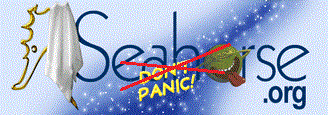Feeding Babies:
These comments are based upon my experience raising 42 baby
H. erectus from three different broods to adulthood.
At this date (June '03) the oldest group is now one year old.
On day one the newborn fry were able to eat newly hatched
artemia, baby brine shrimp (bbs). For this reason and because
the literature I had read did not indicate a need for rotifers
as a first food I did not offer rotifers. Because of my work
schedule I was only able to feed twice daily at approximately
12 hour intervals, typically 6-7 am and 6-7 pm. I feel that
a third midday feeding would be beneficial but my schedule
prevents it. While there are numerous reports that it is necessary
to remove uneaten bbs after a short feeding period I did not
do this. I kept the fry in "flow through" type nurseries
that slowly washed uneaten food out over a period of 1-3 hours.
In some cases I left food in with the fry almost constantly,
it didn't seem to affect survival rates.
As soon as the fry were large enough to take 24 hour old
fortified brine shrimp I stopped feeding the fresh hatch and
fed fortified exclusively. This varied somewhat with the size
and growth of the fry but in all cases was within one week
from birth.
Additionally I offered small amounts of frozen Cyclops-eeze
to the fry from the first day. Most simply ignored it but
some took it so I continued right up to the completed switch
to frozen Hikari mysis.
As the fry grew I began to add newborn lysmata shrimp
larvae to the diet. As soon as they were large enough to eat
them I fed out as much as I could capture, typically once
or twice per week.
At about six weeks many of the fry were large enough to eat
fortified adult brine shrimp. I began to add these to the
diet as well, all the while continuing with the bbs, Cyclops
and shrimp larvae. After a few days of adding the live adult
brine shrimp I began to mix in some frozen brine shrimp as
well. Many of the fry began to eat the frozen as readily as
any of the live foods offered. I always added all of the foods
at the same time hoping that they would fall into a sort of
"feeding frenzy" and start to eat the frozen even
if by accident. This seemed to work. Shortly after a good
number of the fry were eating the frozen adult brine shrimp
I began to add Hikari frozen mysis shrimp, picking only the
smallest ones sorted by hand.
As more and more fry took to the frozen brine and mysis I
dialed back on the live bbs accordingly. I always offered
the lysmata larvae if I had them. By the end of the eighth
week the entire group had been successfully weaned onto the
frozen Hikari though I still offered small amounts of the
other foods for another two weeks or so. As the fry continued
to grow I fed progressively larger Hikari mysis and made the
switch to Piscene Energetics mysis shrimp quite easily.
Personally I feel that the addition of the Lysmata shrimp
larvae helped greatly with the growth and survival of the
fry, despite the fact that they were only given sporadically.
I breed two species, Peppermint shrimp and Scarlet Cleaner
shrimp. Both are commonly available, inexpensive and breed
readily in home aquaria. Unfortunately they are too large
for newly born babies. Recently I have begun collecting hermit
crab larvae which are smaller and may be of great value. Also
I now have a pair of Oscellaris clownfish that are spawning
regularly, I have added these larvae to diet as well.
I hope the above information answers your questions and is
helpful to your breeding program.
|

